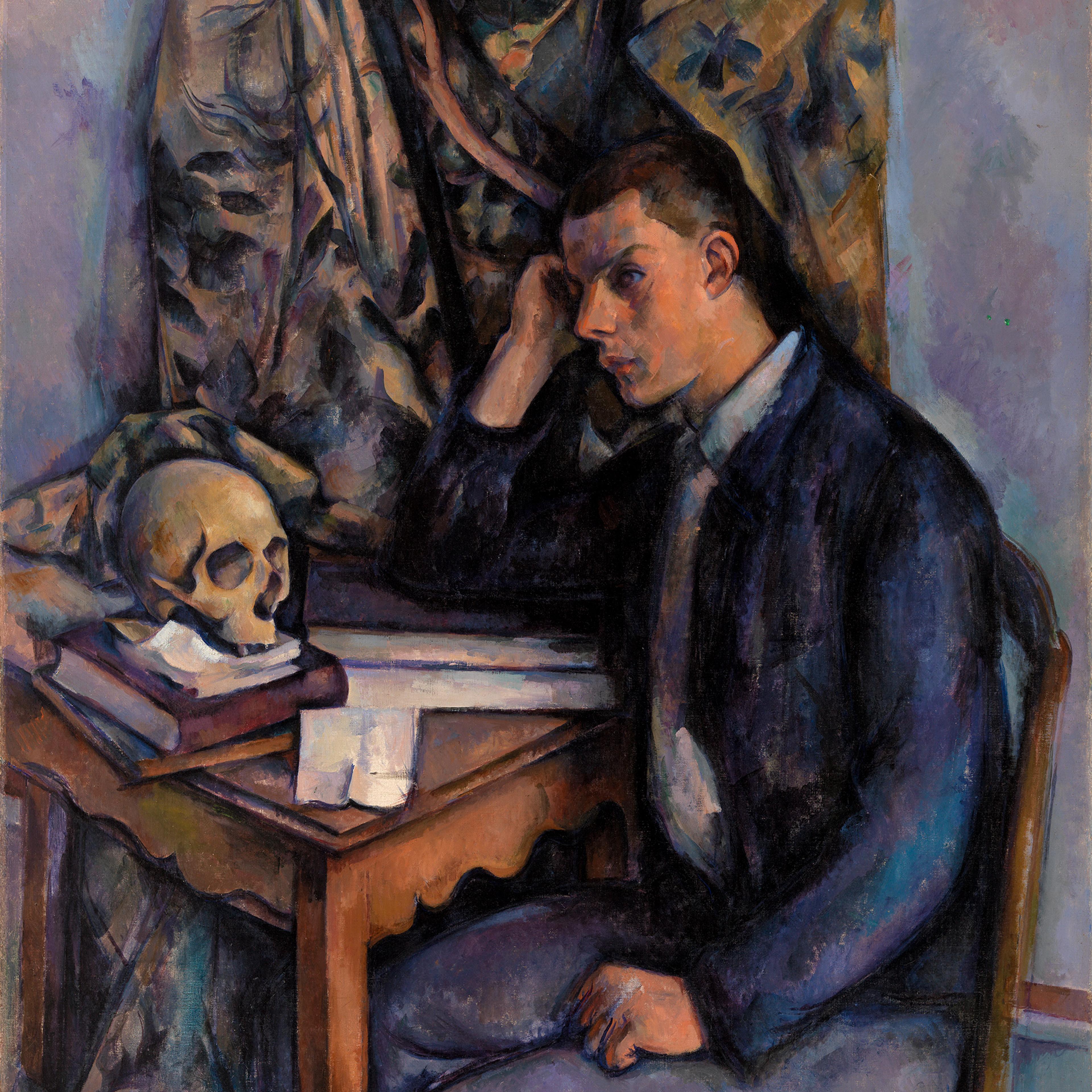Need to know
Your demise is inevitable. I hope that doesn’t come as too much of a shock. I agree that the brevity of human existence is bothersome. Thankfully, for most of us, this frightful fact usually hovers somewhere beyond the margins of our consciousness: we’re ‘aware’ of our death without constantly fearing it.
Inevitably, though, there are moments when the reality of our eventual death strikes us in a new, chillier light. A close call demonstrates the tenuousness of life, or the death of a loved one reminds us that no one is exempt from humanity’s ultimate destination. Even talking about death, as we are now, can be enough to bring on a ruminative contemplation of the end, and with it a shudder of fear about one’s own extinguishment.
In these moments, when your pending dissipation presents itself afresh, the fact of death is experienced in a new way. Rather than merely being ‘known’ like one more quotidian statement about the world – ‘The sky is blue. I will die’ – the sense of one’s ending is felt more deeply and more immediately. In these moods, the terror of death seeps into your awareness of yourself as a person; its awesome inevitability and finality makes you feel small and powerless. This is the fear of death at an existential level, brought on by the almost unthinkable notion that there is and only ever will be one of you – and sooner or later it will flicker out of existence, leaving little more than memories in other soon-to-be-gone beings. The fear of death as I’m discussing it here is not about the practical worry of who will pay off your credit card debt after you’re gone: it’s about the unsettling fact that the person who earned that debt in the first place is but a fleeting speck of an event in the infinite history of the Universe.
The fear of death is also heightened by thinking about how harmful mortality is to us – how there is no greater blow in life than for life to cease. As the philosopher Thomas Nagel observed, death is the great deprivation. There is always more life to be lived, and it is painful to have that taken away. The best way to get at this fear, perhaps, is to contemplate the almost unbearable thought of your future absence: one day, at family dinners, a place will no longer be set for you. The day after you die, the newspaper will still be published just as it was the day before. And the morning after your funeral, friends will make their morning coffee. You will be gone for good, though, and that certainly is a terrifying impediment.
So the fear of death is awful to behold – and therefore, naturally, something to overcome. Indeed, the striving to overcome the fear of death, I would suggest, has stimulated a great deal of thinking over the course of humanity’s time on Earth: one could go so far as to say that working out how to thwart, or perhaps accommodate, death sits at the root of a vast number of cultural achievements. The fear of finitude is a powerful propellant.
So how can the fear of death be overcome? One popular strategy is to plan for a sequel to life, which, it’s usually expected, will take place in another, happier realm. Resurrection, whether as a human or otherwise, has won a great many adherents. And there have been several religions, as well as philosophers, that have promulgated a view of time as cyclical: we’ve done this before, and we’ll do this again. Death as a mere interlude.
These tactics and ideas have something to recommend them, certainly. But for now, let’s set aside all possibility of life after death so that we are left with the often horrifying thought: you exist, but one day you won’t. Are there any good philosophical reasons not to fear that gulf – between being and not-being? In this Guide, I will suggest several philosophically inspired reasons not to be fearful of your own death – and so, in that sense, I hope that there is something helpful here to lighten the weight of the deeply unsettling existential state in which we are all lucky enough to find ourselves.
What to do
The life of the city-dwelling Ancient Greek philosopher Epicurus straddled the 3rd and 4th centuries BCE. His philosophy nowadays is popularly packaged as a kind of light hedonism: sensualist, joyful, a hint of luxury, a naughty second glass of wine. Though Epicurus himself was probably not quite the blinkered and unimaginative pleasure-seeker that these clichés suggest, they do give a flavour of his outlook.
For him, the purpose of human life is to achieve happiness. Epicurus construed this as an absence of pain rather than a positive programme of indulging oneself by, say, keeping up a rigorous schedule of orgies or downing flasks of opium on Tuesday mornings. He recognised that whatever temporary excitement such pursuits yield in the moment will probably be well counterbalanced by a severe price to pay later on. So instead, Epicurus recommended (somewhat disappointingly) that it is moderation that will lead to a release from pain and suffering, which in turn will bring a respectable measure of happiness and therefore a good life. Our limitations, our meagre certainties, are at the centre of Epicurus’ system of thought, and it is in this context of mitigating pain and accruing a gentle happiness that he believed the fear of death needs to be understood. Epicurus and his followers held that the fear of death is harmful to the enjoyment of our lives, and so showing why this fear isn’t well-founded contributes to the overall hedonic project of living well.
According to this tradition, the first thing to do to overcome the fear of death is to try to articulate to yourself what it would be like to be dead. Imagine yourself, but rather than alive – dead. (Remember, we’ve cast aside the afterlife.) As you’ll swiftly appreciate, there is an intractable contradiction right at the centre of this first actionable item. You cannot imagine what it would be like to be dead, because death is an absence of existence. There is, literally, nothing to imagine – because nothingness itself cannot be imagined. There is no perspective, no view from nothingness, nothing to which it can be approximated. So that is the first recommendation: realise that being dead isn’t an experience. Death itself isn’t really a thing at all. In Epicurus’ words: ‘Death is nothing to us.’
To drive the point home, let’s turn to the Roman poet Lucretius. He was a saltier and more ironic Epicurean of a later generation, the 1st century BCE, whose unexampled poem On the Nature of Things fell afoul of early Christians because of its crypto-atheism. In the poem, Lucretius proposes an idea, later termed the ‘Symmetry Argument’, that hints at the second thing you should do to overcome the fear of death: try to recall what it was like before you were born. Not how the world was, which is the task of historical imagination, but what it was like to be you – before you were created. You’ll discover that prenatal existence isn’t something that can be thought about, much less experienced. The symmetrical part of the argument, of course, is that you have the very same difficulty in imagining what it is like to be dead. Indeed, according to Lucretius, you-pre-existence is the same thing as death or post-existence: both involve the absence of you. No doubt you don’t fear your prenatal existence and logically speaking, given their equivalence, it follows that you should fear death the exact same amount, as in not at all. (As the novelist Vladimir Nabokov put it in his memoirs: ‘common sense tells us that our existence is but a brief crack of light between two eternities of darkness.’)
This brings us to the third thing to do to calm your existential angst: examine how much ‘nothing’ – nonexistence – can reasonably be feared. That is, are there any good reasons for your pending death to trigger the emotion of fear? It is reasonable to be fearful of things to the extent that those things can cause you harm. It was reasonable to be jittery about nukes during the Cold War era; it is reasonable to be scared that humanity is turning the globe into a sauna; and it is reasonable for your heart to launch as from a trebuchet into your throat when your partner says to you the words ‘We need to talk.’ These are all identifiable threats that foretell awful experiences. None of them would help us in our Epicurean goal of being happy, and so are reasonably feared.
But death itself – not the process of dying, which is something different – doesn’t seem to be the sort of thing that one can reasonably be fearful of because it isn’t anything. It’s not uncomfortable or hurtful to be dead. It’s not as if you’re being deprived of life or of more contented years because, again, you simply aren’t there to be deprived in the first place. For you, there is nowhere to locate the harm of being dead since being dead isn’t a state of being. It’s not something that strictly speaking happens to you and so it can’t be harmful. (No one would say St Francis of Assisi is more dead than the punk rocker ‘GG’ Allin because St Francis died longer ago.) Death is the absence of an event; it’s not a happening or a thing at all because there isn’t such a thing as you any longer. Even something that you dreamed or imagined – say, a stranger standing silently by your bed as you wake – has a kind of existence necessary for it to be the reasonable object of a fear, even if it turns out to have been the shadow of a tree. Death itself doesn’t have this quality. And Lucretius would add: it is just as unreasonable to fear nonexistence after life as it is to fear nonexistence before birth.
This is the heart of Epicurus’ and Lucretius’ argument for why there is no good reason to fear death. Note that their argument doesn’t speak to the fear that others will die, which is a perfectly reasonable anxiety and one that we should arguably heighten, given that fearing the death of fellow humans can make us more empathetic of their needs. No, the Epicurean argument against the fear of death concerns only your own self and its dissolution.
When I think through these steps, I find that their efficacy is largely dependent upon my mood. I like the idea of being able to intellectualise away the fear of death, as if merely thinking philosophical thoughts would be enough to give me courage. And when I’m particularly despondent or detached from the world, perhaps there are glimmers of comfort from the argument that death is nothing. But commonly this line of thinking doesn’t completely allay the fear of death (I hazard to guess that for you, too, the fear is still somewhat present).
Epicurus recognised this. His argument by itself isn’t strong enough to completely release us from the dread of a terminal existence. I doubt that anything is – or rather, I wouldn’t trust anything that, truly and fully, did free one from fear of death (there are certain brands of fanaticism, for instance, that appear to do just this, with obviously horrific results). But as the contemporary philosopher James Warren emphasises, Epicurus’ argument should be borne in mind as part of a ‘cognitive therapy’ for dealing with one’s own life. It can have its fruits. It can lighten a little the fear of death, which in turn can subtly augment your enjoyment of life – and that is, on the whole, one of the great purposes of being here in the first place.
Key points – How to not fear your death
- The end of your existence is inevitable. The question is whether or not you should fear it.
- Epicurus, and many others besides, have argued that there are reasons not to fear death.
- His argument, essentially, is this: when you are alive, death is nothing. When you are dead, life is nothing.
- The argument is meant to relieve only some of the fear of death and to give you a new vista from which to enjoy your own fleeting time on Earth. Banishing all fear of death would turn you into something barely human, as fanatics the world over have amply demonstrated.
- Philosophy can be a useful meditation on what it is to live well. Thinking about one’s own death can focus one’s attention on what it is that makes life so valuable.
Learn more
Epicurus’ argument against the fear of death has been challenged far and wide. Perhaps the best-known counterpoint in modern times comes from Nagel, in his esteemed paper ‘Death’ (1970), which did much to renew philosophical attention on the problems of not-being. The gist of Nagel’s argument is that there is something to fear in our own non-existence. Their disagreement goes right to the heart of the Epicurean view. Nagel says that Epicurus is wrong: death obviously does deprive us of the possibility of the joys of life; only airy-headed philosophers indulging in their wanton complexities would deny so simple a truth. An example: the brilliant philosopher and mathematician Frank Ramsey died at 26. It is reasonable to hold that his death deprived him – and the world – of uncountable, perhaps now-inconceivable, philosophical insights. But it also took away from him the quiet charms of growing older, the wisdom of age (such as it is), the elation of having children, and so on. That is, it eliminated the possibility of him living what we often call a ‘full life’. In that sense, death was very bad for Ramsey, as it is for all of us. Outside of the most extreme supercentenarian or those with wretchedly debilitating and incurable diseases, death removes something that we would have otherwise enjoyed, had death not made its unwelcome intervention (‘it may be that a bad end is in store for us all,’ writes Nagel wearily towards the end of his paper). For the great majority of lives, death deprives. That alone is a good enough reason to fear death, or so Nagel would say.
Nagel’s argument involves a shift of perspective made clear by his reliance on the death of other people, using their ends as a way of demonstrating the badness of death for everyone. His stance was elaborated in 2009 by the philosopher Ben Bradley using the terminology of possible worlds, the basic gist of which is to compare possibilities, treat each possibility as real, and then decide which possible world is better. It seems intuitive that the possible worlds in which Ramsey lives longer are better than the possible (and, unfortunately, actual) world in which he died at 26, and it suitably follows that death is bad and should be feared. But this perspective, however compelling, abandons the first-person – indeed, existential – vista of the Epicureans, whose philosophy, like that of most other ancients, is inextricable from their ethical outlook. Because the Epicurean argument can in theory make life itself more enjoyable, and pleasure is the purpose of life, then their argument is more likely to be true, according to them. To the Epicurean, pontificating about possible worlds is of doubtful value when it comes to the lived enjoyment of one’s own life, especially when the end result is to increase the fear of death.
Of course, there are further objections to be made against the Epicurean view but, more interesting for our purposes, there is a side to the ‘death-is-nothing’ approach that makes the inherent value of life more noticeable. This idea finds a much fuller appreciation in 20th-century philosophy than among the ancients, though it was present even then. I’m referring to the startling notion that there is a positive good in one’s own death. Since death limits us absolutely, it gives shape to our existence. We are here only briefly, and because of this transience, we are more likely to value our time. This is made most clear by considering the alternative: corporeal immortality. The Epicureans, Lucretius especially, thought that everlasting bodily life would be hell on Earth, and I think they’re on to something.
Without death, life would be nothing but a dire repetition, pointless and endless. Immeasurably long lives would eventually deflate into the most banal tedium. Millennia upon millennia upon millennia would have to be lived out and, even then, there would be an eternity to go. Eventually the most sublime and wondrous experiences possible would become punishing in their drab familiarity. Fortunately, this isn’t a possibility that need concern us too much. But confronting the alternative to death brings home the point – no matter how terrifying it might be, the fact of death makes life more brilliant and precious. The time we have together in this place is fleeting: let’s spend it well.
Links & books
For an approachable introduction to the philosophy of death, Shelly Kagan’s free course, offered through Yale University, is excellent. Packed with material, a comprehensive syllabus and compelling lectures, it’s a great place to start.
Another solid introductory text is Steven Luper’s The Philosophy of Death (2012), which is probably the academic standard right now.
The wonderful Simon Critchley in 2009 delivered a lecture to the New School in New York City entitled ‘To Philosophise Is to Learn How to Die’. When I first watched it, I found it spellbinding and I’m glad to say that it still is.
For a deeper dive – and for deeper pockets – The Oxford Handbook of Philosophy of Death (2012) is an invaluable resource, with essays covering many of the primary topics in the philosophy of death, though mostly from an analytic perspective (so not a lot of crosscultural work going on here). Phillip Mitsis’s essay on Epicurus and John Broome’s essay on the badness of death are highly recommended.
The best recent book on Epicurus is called How to Be an Epicurean: The Ancient Art of Living Well (2019) by Catherine Wilson (who is also an Aeon contributor).
James Warren is also a premier scholar of Epicureanism; for a more demanding and academic treatment of the subject, you could hardly do better than Facing Death: Epicurus and his Critics (2004).
We’ve also published a wonderful short piece on Aeon about Epicurean ideas in the modern world by Temma Ehrenfeld.
A short and easily digestible video on Epicurus’ wider philosophy – beyond his overcoming the fear of death – can be found here, by the online ‘philosophical entertainer’ Einzelgänger.
Finally, Aeon Video featured a very moving and thought-provoking documentary on the last few months of the philosopher Herbert Fingarette’s life as he grapples with the imminence of death – and whether or not Epicurus’ views really do hold up when the end is, at last, here.



